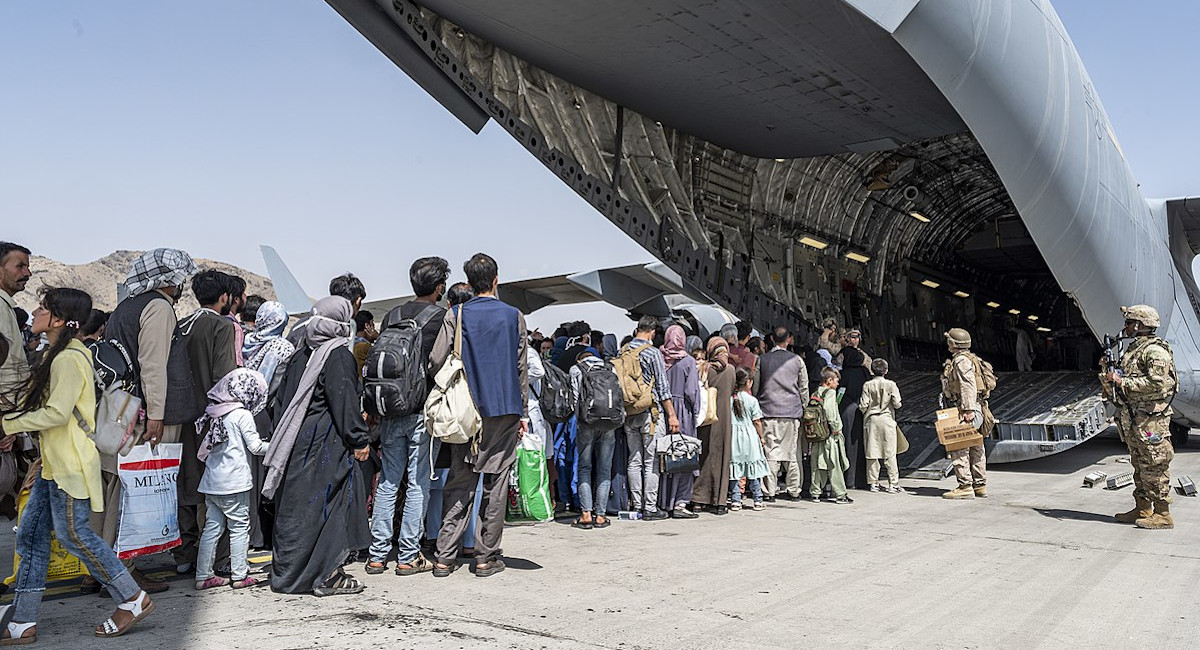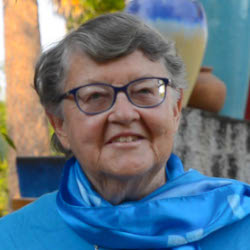
US Airmen and US Marines guide qualified evacuees aboard a US Air Force C-17 Globemaster III in support of the Afghanistan evacuation at Hamid Karzai International Airport (HKIA), Afghanistan, 21 August 2021 | Public Domain
On 26 September, the Church celebrates the World Day of Migrants and Refugees. Pope Francis holds in his heart the millions of people forced to migrate because of war, persecution, poverty, or environmental change, as he calls us to a more inclusive “we”. He asks that we expand our vision and compassion so that we include in our hearts our natural world and all the peoples who inhabit it. He asks us to remember in prayer and act vulnerable migrants. Recent events in Afghanistan highlight the desperation of many people as does the ongoing crisis in Myanmar. With the effects of the pandemic, we realise that the whole world is challenged to work together to address the needs and rights of people affected by forced migration.
Pope Francis calls us to act on a personal, community, and national level. Can I meet with a newly arrived migrant and listen to her story? Could my family or my community offer hospitality? We can cheek how welcoming our country is to forcibly displaced persons and then say something if change is needed. The Pope also asks us to think globally. In fact, when the Holy See signed the Global Compact on Migration at the United Nations in 2018, the Pope invited the whole Catholic Community to do their part in making it happen.
Carolyn Gottardo says the Global Compact draws us to an ever more inclusive “we” because it
- calls on the whole of society to respond to the plight of vulnerable migrants;
- protects the safety, dignity, human rights of all migrants whatever their status;
- balances the needs of migrants and needs of receiving communities;
- combats racism and discrimination towards all migrants;
- supports countries rescuing, receiving and hosting large number of refugees and migrants; and
- develops guidelines for treatment of migrants in vulnerable situations.
In May 2022, the first Review Conference of this Compact will be held at the UN. This is where states will present their progress and be called to account if they have breached this international norm. This is a chance for faith-based organisations and other members of civil society to have their voices heard. We can speak to our country leaders in the lead up to the Review, if we know the situation at grassroots. The Global Migration Advocacy Network (GIAN) stresses the multiple causes of migration and that a person may flee for mixed reasons.
So to understand the situation in our country, each of us can reflect on:
- Who are the vulnerable migrants in our country?
- vulnerable migrant workers going abroad
- vulnerable migrant workers coming in to our country
- refugees arriving, refugees fleeing
- internally displaced
- stateless people
- people trafficked in for sex, labour, etc
- people trafficked out
- Then we can ask how the Jesuits in our country, other faith-based organisations, and the Church as a whole are responding to the basic needs for
- shelter, friendship, hospitality, counselling;
- access to education and health ;
- protection, legal advice, documents, workers’ rights
Obviously we cannot do everything but WE CAN DO SOMETHING. Listening to the voice of the migrants themselves, and collaboration are key. Seeing the gaps and the challenges to more effective action from different voices will create new and exciting ways to respond. It will also enrich global civil society and our Church as they advocate at the Migration Review Conference in May 2022.
The global advocacy group names what they want to push in at the Review Conference:
- to disarm the toxic narrative about migration, including race and ethnic stereotyping;
- to address persistent barriers to education, health, and registration; and
- to stop immigration detention
We have a good entry into this forum through Cecilie Kern of Mercy Global Action, who is the vice chair of the group. So our local data gathering and action can have global consequences. We can also submit it to the Vatican Dicastery.
Some might argue that the Global Compact on Migration is useless in Japan, Korea, or Australia because these countries did not sign it. However, 150 countries did sign. It is not perfect but it is the only Global Compact on Migration we have. We need to promote this international norm in union with Pope Francis and the most vulnerable of our human brothers and sisters.
Addressing the root causes in home countries that force people to flee is equally as important as addressing the plight of vulnerable migrants. But on 26 September, let us pray and act and dream for a world that embraces migrants.







